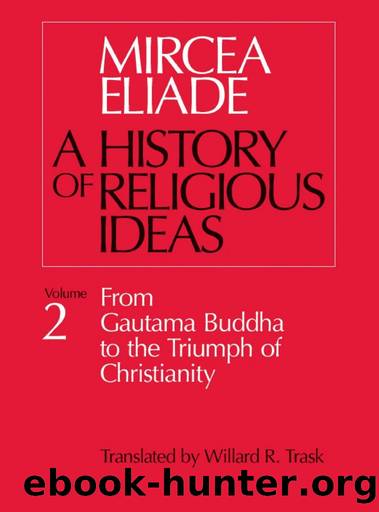From Gautama Buddha to the Triumph of Christianity by Mircea Eliade

Author:Mircea Eliade [Eliade, Mircea]
Language: eng
Format: azw3
Tags: French Literature, Religion, Nonfiction, History
ISBN: 9780226027357
Publisher: University of Chicago Press
Published: 2011-12-16T00:00:00+00:00
221. The birth of the Church
On the day of Pentecost in the year 30, Jesusâ disciples were all together âwhen suddenly they all heard what sounded like a powerful wind from heaven, the noise of which filled the entire house in which they were sitting; and something appeared to them which seemed like tongues of fire; these separated and came to rest on the head of each of them. They were all filled with the Holy Spirit, and began to speak foreign languagesâ (Acts 2:1â4). Fiery epiphanies of the Holy Spirit are a rather well-known theme in the history of religions: they are found in Mesopotamia (§ 20), in Iran (§ 104), in India (Buddha, MahÄvÄ«ra, etc.; § 152). But the context of the Pentecost has a more definite aim: the violent wind, the tongues of fire, and the glossolalia are reminiscent of certain traditions concerning the theophany on Sinai25 (see § 59). In other words, the descent of the Holy Spirit is interpreted as a new revelation from God, similar to the revelation on Sinai. The day of Pentecost sees the birth of the Christian Church. It was not until after they had received the Holy Spirit that the Apostles began preaching the Gospel and producing many âmiracles and signsâ (Acts 2:43).
On that day Peter addressed to the crowd the first summons to conversion. He and his companions bore witness to the Resurrection of Jesus Christ; it was God who resurrected him (2:24, 32, etc.). The miracle had already been predicted by David (2:31); hence the Resurrection is the eschatological event foretold by the prophets (2:17â21). Peter adjured the Jews to repent, adding that âevery one of you must be baptized in the name of Jesus Christ for the forgiveness of your sins, and you will receive the gift of the Holy Spiritâ (2:38). This first harangue, which became the exemplary model for the kerygma (the Christian âproclamationâ), was followed by numerous conversions (three thousand according to Acts 2:41). On another occasion (he had just cured a man crippled from birth; Acts 3:1â9), Peter exhorted the Jews to recognize that they had been wrong, though out of ignorance, when they condemned Jesus, and to repent and accept baptism (Acts 3:13â19).
The Acts of the Apostles afford us a glimpse of the life of the first Christian community in Jerusalem (to which the author gives the Greek name ecclÄsia). Apparently its members still followed the traditional religious discipline (circumcision of male infants, ritual purifications, rest on the Sabbath, prayers in the Temple). But they often met for instruction, breaking bread, the agapes, and to pray and praise God (2:42, 46). However, the Book of Acts (which cites many examples of preaching to unbelievers) tells us nothing of the instruction given to members of the community. As for economic organization, it states that âthe faithful all . . . owned everything in common; they sold their goods and possessions and shared out the proceeds among themselves according to what each one neededâ (2:44â45).
Download
This site does not store any files on its server. We only index and link to content provided by other sites. Please contact the content providers to delete copyright contents if any and email us, we'll remove relevant links or contents immediately.
What Is the Gospel? (Foreword by D. A. Carson) by Greg Gilbert(989)
Jesus in Me by Anne Graham Lotz(941)
Daily Strength: Devotions for Bible Believing Study by Douglas Stauffer & Andrew Ray & Rick Quatro(896)
Christian Ethics by Wilkens Steve;(854)
The Practice Is the Path by Tias Little(817)
New Morning Mercies by Tripp Paul David(806)
Cleaning Up Your Mental Mess by Dr. Caroline Leaf(738)
Veritas: A Harvard Professor, a Con Man and the Gospel of Jesus's Wife by Ariel Sabar(721)
Greatest Mystery in the World by Og Mandino(666)
The Creative Call by Janice Elsheimer(596)
No More Christian Nice Guy by Paul Coughlin(581)
Our Appointment with Life by Thich Nhat Hanh(571)
Monastic Archaeology by Unknown(564)
2084 by John C. Lennox(556)
This One Wild and Precious Life by Sarah Wilson(542)
Jesus--Awesome Power, Awesome Love (Discover 4 Yourself® Inductive Bible Studies for Kids) by Kay Arthur(532)
The Duties of Parents by J.C. Ryle(514)
The Catholic Verses: 95 Bible Passages That Confound Protestants by Dave Armstrong(510)
The Tale of the Tardy Oxcart (Swindoll Leadership Library) by Swindoll Charles R(492)
